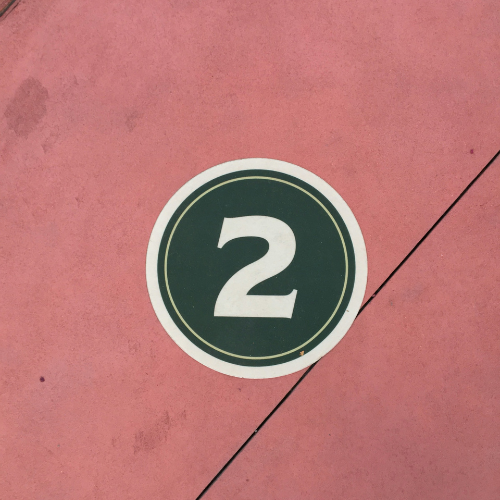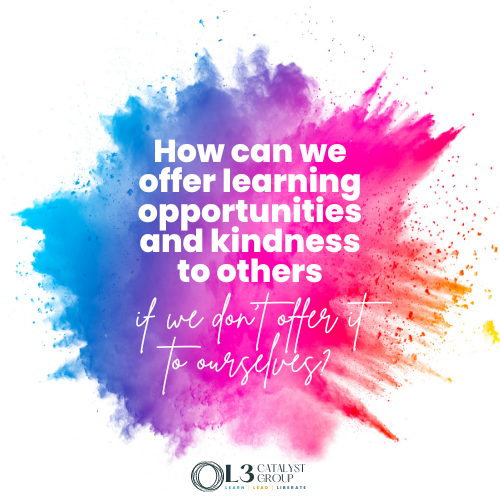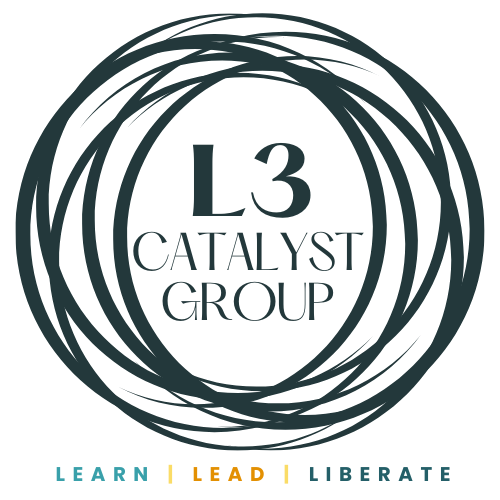Inclusion Beyond the Gender Binary
Tips for Inclusion in a Binary World
Happy Trans Week of Visibility!
There are at least 1.4 million transgender adults in the United States. Of those 23-35 percent are nonbinary. (UCLA School of Law, 2022)
Being non-gender conforming, nonbinary, or genderqueer is within the transgender umbrella. While this isn’t the first time on L3 Catalyst Group’s blog that we’ve talked about mindsets and practices that operate in strict binaries (Leadership + the Binary or On Being Genderqueer), this is Trans Week of Visibility. In the U.S. laws are regularly being proposed and passed to remove rights of queer and transgender folks.
If you want to make the world more inclusive for gender non-conforming people, this blog is for you.

Here are a few tangible practices:
1. Change the wording in policies and practices to stretch beyond the gender binary.
Identify and modify policies, forms, and internal documents that mention only a gender binary of male and female, expanding the options to be more inclusive.
Do your demographic questions in surveys or policies mention only men or women? Add nonbinary or gender non-conforming options.
Are there binary gendered clothing requirements or guidelines? Make it more expansive to not specify differences based on gender.
2. Speak up when you hear someone excluding nonbinary or gender non-conforming people.
Notice when you or others say “hello ladies” or “brothers and sisters.” Incorporate more expansive words like friends, colleagues, amazing people, siblings, etc. Practice. Invite others into right-relationship by correcting them when they use gendered language.
3. Mistakes are a part of learning. Know what to do when you make a mistake, misgender someone, or use a gendered term.
Gender identity isn’t always visible. We can't tell someone's gender by looking at them. We all make mistakes, and it’s a gift when someone points out our mistakes because it's an opportunity to learn and apply our learning the next time. Take a breath. Pause. Thank the person for their correction. Apologize sincerely and succinctly. Move back into the conversation.
4. Own your learning and application. Don’t expect nonbinary people to be your teacher.
And…don’t be afraid to ask gender non-conforming people a question if you’ve researched it first from an reputable source. Respect the fact that not everyone wants to be a teacher with someone who doesn't share their identity. Some nonbinary folks want to help others understand and are willing to entertain your questions; some may not. For some of us, this may fluctuate from day to day. I’m often willing to answer a kind and curious question as long as my gut tells me that the person isn’t trying to find reasons to prove that I’m an abomination. (Yes, we do get called that regularly.)
5. Create opportunities for questions, learning, and practice.
We don’t know what we don’t know....and the gender binary is enculturated into us as the “right” way, which takes unlearning and re-learning. I believe that many people want to be more inclusive but may not know what to say or how to make that real. We all need a place to practice and ask questions, not at the expense of gender-nonconforming people. We demonstrate our commitment to perfection over learning if we don’t have spaces to question, learn, and practice. Investing in learning and practice spaces is critical. Holding space for adult learning is a significant component of changing organizational culture.

Heartfelt thanks for doing the right thing as you work to make your mindsets, workplaces, and this world a more inclusive space for gender non-conforming folks.
Beloveds, I wish you courage, rest, and community along the journey,

To Read & Learn More:
- Anti-Trans Legislative Risk Assessment Map - February Update by Erin Reed
- Quick Guide to Singular "They" by Teaching Outside the Binary
- You messed up! What to say when you misgender someone by Liz Brinks.
Ways to get involved:
- Read L3 Catalyst Group’s March 2024 Newsletter: Embracing the Messy…with Dee
- Register today for one or all of our monthly Equity Leadership Conversations. Our free virtual events are designed to build community, share ideas, grapple together, and converse about leadership, learning, and liberation themes.
- Difficult Conversations - Why are they so hard? What can we do about it? April 17 at 10 PST / 1 EST
- Applying Intersectionality: Isn’t it simply the presence of difference? May 16 at 9 PST / 12 EST
- Experiential Learning Cycle: How do adults learn best, and how can we apply that at our organization? with Bela Bhasin on June 4 at 9 PST / 12 EST
- Register for one or all of our free webinars: Developing Liberatory Leadership & Teams. Do you want to grow your capacity to build and maintain an equitable and inclusive organizational culture?
- Leading for Equity in Complex Systems: How do we recognize and navigate the inherent tensions, contradictions, & uncertainty in leading for equity in complex systems? April 18 from 10-11 PST / 1-2 EST
- Engaging Relationally to Work for Equity: How do we work and be in relationship differently? May 23 from 10-11 PST / 1-2 EST
- Designing Towards Liberation: How do we design human spaces differently? June 12 from 10-11 PST / 1-2 EST

March 27, 2024




Comments